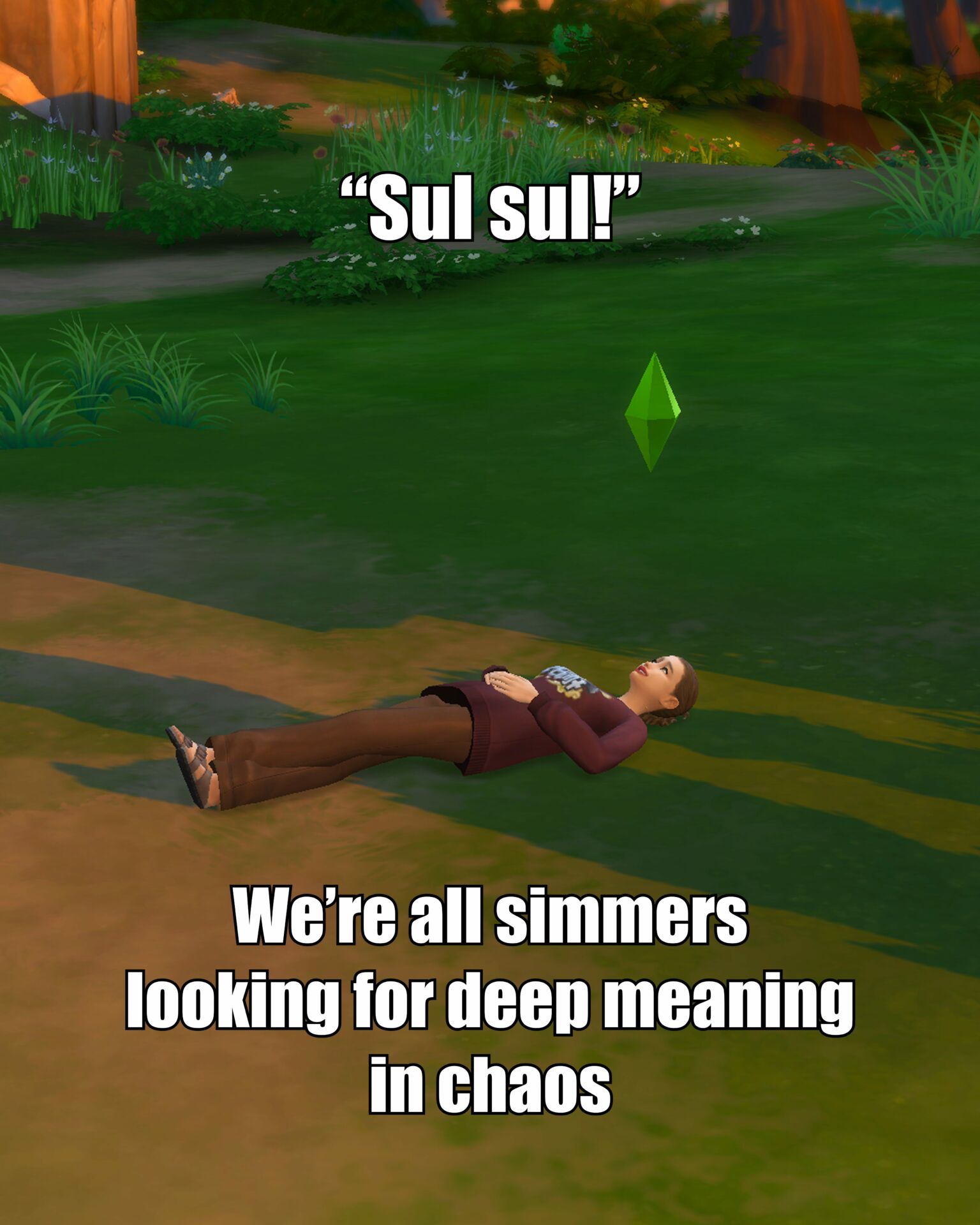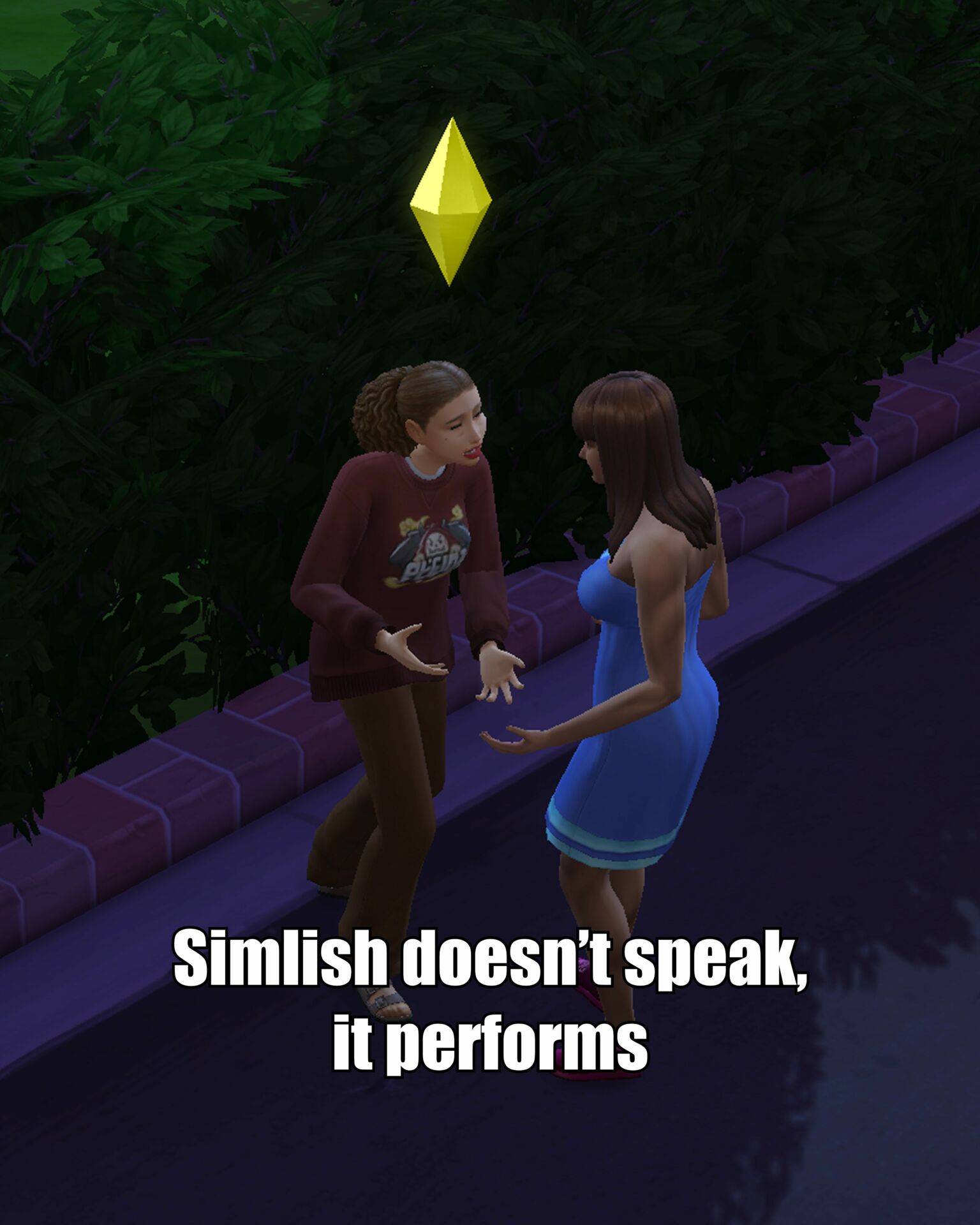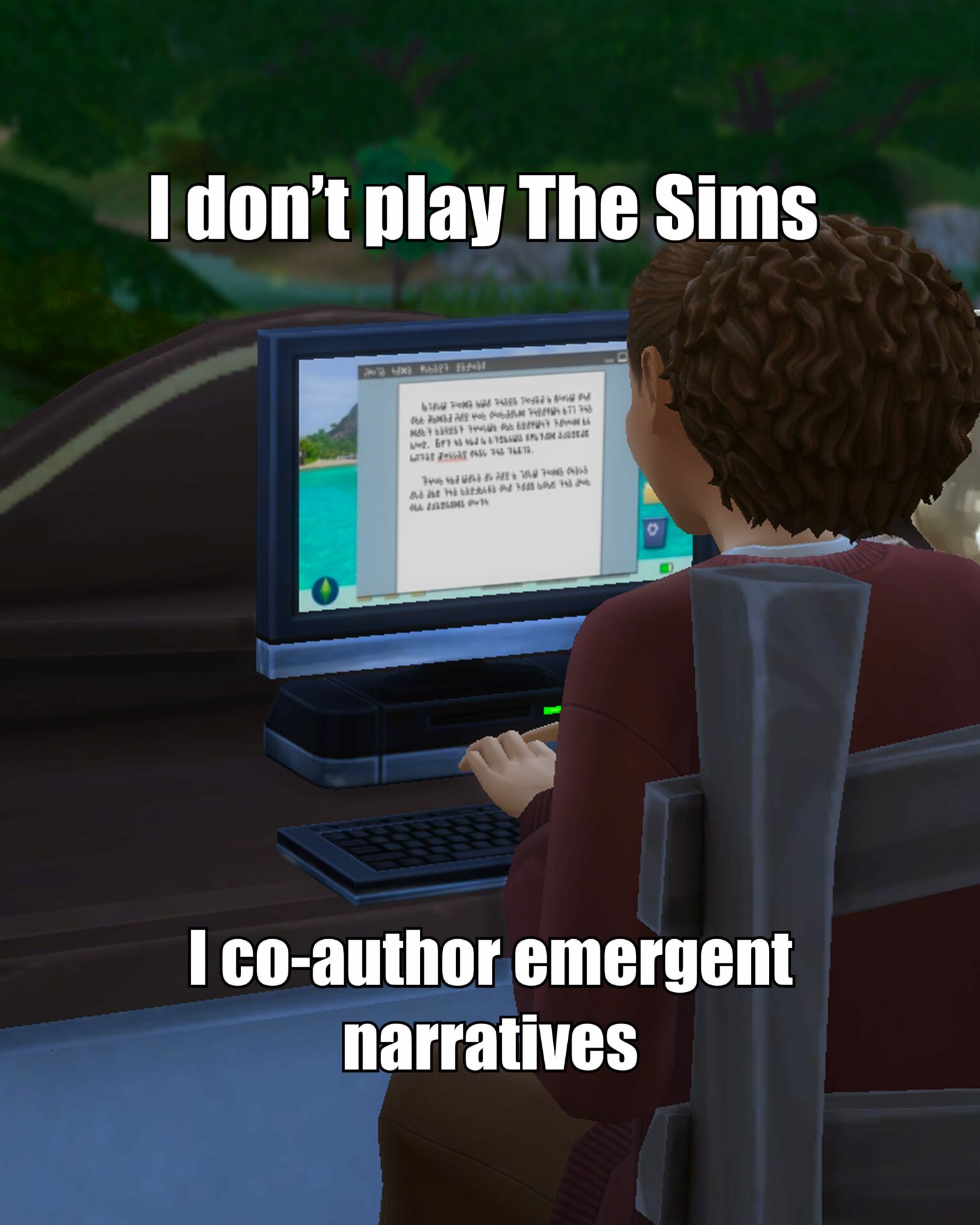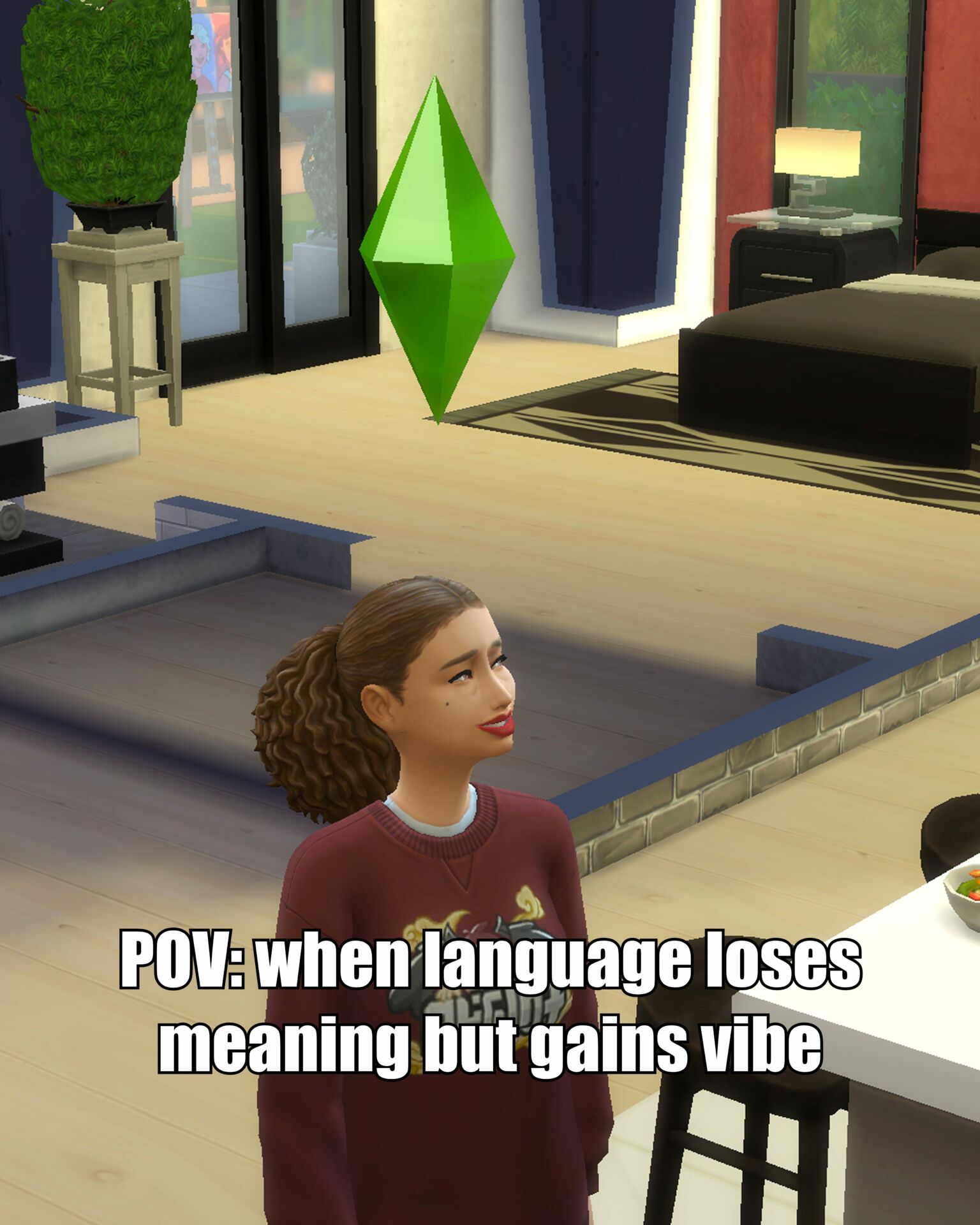Created by Will Wright and his game development team, Simlish lacks a defined grammar and conventional vocabulary, yet still manages to convey meanings, emotions, and complex situations within the game world. This language, born out of the need to bypass using real-world languages, has an intriguing history that speaks to the desire to create a more immediate connection between player and game. Wright’s decision not to use real-world languages was driven by the wish to prevent players from focusing on the words themselves, and instead concentrate on the characters’ emotions, desires, and interactions. It wasn’t merely a practical device to avoid the repetitiveness that would come from using real languages, but an aesthetic and philosophical choice that makes Simlish a universal language, capable of connecting players through emotional perception rather than semantic understanding.


The creation of a language without predefined meaning inevitably prompts a deeper reflection on the nature of language itself, and how communication does not rely solely on a fixed semantic code, but on the ability to create meaning through interpretation. Simlish is not just a form of language, but a performative practice that reveals the possibilities of a world in which communication originates from interaction, expression, and emotional connection between subjects, rather than from the direct meaning of a conventional symbolic system. The language of the Sims is a sort of “emergent” language, constructed in real time between avatars and players, giving life to a shared and dynamic narrative.
In The Sims, the meaning of Simlish is neither predetermined nor rigidly codified; instead, it is created through the dynamic interaction between the game system and the players’ perception. Every sound, every intonation, every character’s expression becomes a fragment of meaning built through each interaction, in a continuous process of feedback between the character’s emotions and the player’s response. It is not merely a linguistic code used by the characters with each other, but becomes a driver that fuels a virtual social reality – an emotional and relational ecosystem that develops in real time, beyond the conventions of natural language. From this perspective, the words and sounds of Simlish gain social meaning precisely through interpretation. Every utterance, though lacking a direct connection to the traditional meaning of words, gains value inasmuch as it is perceived and interpreted by the player, who constructs meaning through context and interaction. What seems like a meaningless language becomes a bridge between the digital world and the human world – a place where reality and fiction intersect and blur, feeding an unprecedented immersive experience.
One is thus prompted to ask: what does it mean for an avatar to communicate? If the language of The Sims is nothing more than an emergent system of signals and interpretations, what role does the player play in all this? The interpretation of avatars’ emotions does not only derive from recognising familiar sounds or explicitly understanding their intentions, but from an act of interpretation embedded within a dynamic and interactive context: players not only interpret linguistic signals but actively participate in creating the narrative. The avatars, through their actions and their emotions expressed in Simlish, become intentional entities, and the player is led to interpret these signals as manifestations of desires, emotions, and intentions, constructing a virtual psycho-social reality. In The Sims, then, language is a tool of subjectivation: every interaction, every “word” uttered by the characters becomes a manifestation of a desire or intention, and the game, through its ability to generate unpredictable situations and narratives, provides the player with tools to interpret and assign meaning to these actions. However, this interpretation is never entirely free or autonomous. The avatars, while capable of “expressing” emotions and desires, are subject to a code which, while allowing space for interaction, partly defines the limits of their agency. True agency is manifested through the player’s ability to react, manipulate, and influence the course of events – creating, in turn, a narrative that merges with that of the game. The concept of agency, therefore, interestingly overlaps between avatar and player, giving rise to a co-creation of the simulated reality. While the avatar possesses a form of programmed agency, the player exercises a reactive one – responding to the provocations and stimuli offered by the game. This reciprocal influence challenges the very nature of subjectivity and consciousness, not only with regard to the avatars but also in relation to human beings, who through digital technology experience new forms of existence and interaction.


It is a performative language. Simlish presents itself as a linguistic device rooted in a radical post-linguistic tension. Its artificiality is not a limitation, but a resource – an aesthetic gesture that echoes the principles of asemic writing. In this grey area between code and chaos, Simlish does not try to “say”, but to evoke – to stimulate an affective and interpretative reaction. In this sense, it fits into post-structuralist reflections on the death of the author and the crisis of stable meaning: every Simlish utterance is simultaneously universal and unrepeatable, because it depends entirely on context, on gesture, on intonation, and above all on the eye of the player who observes. It is not a language that represents the world, but one that reinvents it. This condition opens a further space for reflection on the user’s subjectivity. If the avatar functions as a digital mirror – a double that does not faithfully reflect the image but distorts it – then the relationship between player and character hinges on recognition. Every emotion that the user projects onto the Sim is always a mirrored and deferred operation – a desire dressed as fiction, an identity explored through simulation. Language here becomes an opaque lens: instead of showing clearly, it allows glimpses; it transforms every interpretation into a creative act. Simlish, then, is not an obstacle to communication, but its most radical catalyst, because it demands a continual effort of imagination.
The Sims, in our hands, becomes a laboratory of contemporary being, where language no longer serves to represent, but to deconstruct and recompose the subject in its relationship with the machine. It is a speculative, almost philosophical ground, where saying is replaced by “experiencing” language.
Born in 1992, he writes to decipher contemporaneity and the future. Between language, desire and utopias, he explores new visions of the world, searching for alternative and possible spaces of existence. In 2022, he founded a thought and dissemination project called Fucina.